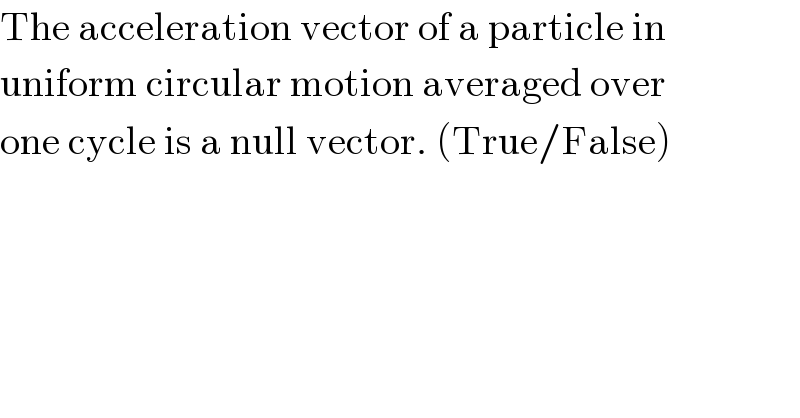
Question Number 16502 by Tinkutara last updated on 23/Jun/17

$$\mathrm{The}\:\mathrm{acceleration}\:\mathrm{vector}\:\mathrm{of}\:\mathrm{a}\:\mathrm{particle}\:\mathrm{in} \\ $$$$\mathrm{uniform}\:\mathrm{circular}\:\mathrm{motion}\:\mathrm{averaged}\:\mathrm{over} \\ $$$$\mathrm{one}\:\mathrm{cycle}\:\mathrm{is}\:\mathrm{a}\:\mathrm{null}\:\mathrm{vector}.\:\left(\mathrm{True}/\mathrm{False}\right) \\ $$
Answered by ajfour last updated on 23/Jun/17
![a^� = −(v_0 ^2 /r) r^� =−(v_0 ^2 /r)(cos θ i^� +sin θ j^� ) ⟨a^� ⟩=−(v_0 ^2 /r)[ ⟨cos θ⟩i^� +⟨sin θ⟩j^� ] =−(v_0 ^2 /r)[ 0 i^� + 0 j^� ] =0 for △θ =2nπ .](Q16534.png)
$$\bar {{a}}=\:−\frac{{v}_{\mathrm{0}} ^{\mathrm{2}} }{{r}}\:\hat {{r}}\:=−\frac{{v}_{\mathrm{0}} ^{\mathrm{2}} }{{r}}\left(\mathrm{cos}\:\theta\:\hat {{i}}+\mathrm{sin}\:\theta\:\hat {{j}}\right) \\ $$$$\langle\bar {{a}}\rangle=−\frac{{v}_{\mathrm{0}} ^{\mathrm{2}} }{{r}}\left[\:\langle\mathrm{cos}\:\theta\rangle\hat {{i}}+\langle\mathrm{sin}\:\theta\rangle\hat {{j}}\:\right] \\ $$$$\:\:\:\:\:\:=−\frac{{v}_{\mathrm{0}} ^{\mathrm{2}} }{{r}}\left[\:\mathrm{0}\:\hat {{i}}\:+\:\mathrm{0}\:\hat {{j}}\:\right]\:=\mathrm{0}\:\: \\ $$$$\:\:\:\:\:\:{for}\:\bigtriangleup\theta\:=\mathrm{2}{n}\pi\:. \\ $$
